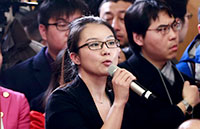New paths open to foreign students in Beijing
By Zhao Xinying (chinadaily.com.cn) Updated: 2016-01-13 11:58International students will have more opportunities for internships, to take part-time jobs and even to start their own businesses in certain regions of Beijing, under a series of new policies released on Tuesday.
Starting on March 1, foreign students can be given short-term internships in Zhongguancun, a science and technology area in Beijing's Haidian district, while international students studying at Beijing universities can take part-time jobs or become involved in entrepreneurship in the area, the Ministry of Public Security said on its website.
The new policies were applauded by university teachers in charge of international student affairs and by others who help develop employment opportunities for the students in China.
Li Yong, director of the student affairs department in the School of International Education at the University of International Business and Economics in Beijing, said teachers doing his job at universities in Beijing had been concerned about their international students' opportunities of having internship, jobs and entrepreneurship since late 2013.
At that time, the ministry released a series of regulations raising employment thresholds for international students, whether through an internship or a regular job.
"Now with the opening of Zhongguancun to international students, we don't have to worry about the issue that much," said Li, who serves more than 3,000 international students at UIBE, which is among the universities with the largest number of international students in the country. "It's really great news and will definitely help China attract more international students."
Kwon Jae-young, director of the support center for South Korean people who want to start businesses in China, was also glad to hear the news.
"It will provide more possibilities and opportunities for international students who want to find jobs or start businesses in China," he said.
A survey of more than 300 Korean students studying in China found that 90 percent wanted to stay in China — by landing a job or starting a business in the country after graduation.
"But there were many difficulties for them," said Kwon, adding that this was why the center was set up on the campus of UIBE in September with the support of the South Korean Ministry of Future Creation and Science.
Through workshops and training sessions, the center taught the essentials for Korean people who want to start a business in China — commercial laws, how to cooperate, how to apply for business licenses in China and other matters.
Han Kang-Il, chief director of the center, said it had already cooperated with Dongsheng Science Park of Zhongguancun Area. The park has been acting as an incubator for members' entrepreneurial ideas, Han said.
"We may have more partners and incubators after the whole area is open to international students," Han said.
- China's first Arab Policy Paper sets out development strategies
- New fonts give Tibetans texting options
- LGBT tourism services eyed for growth prospects
- Lawsuits bloom under regional litigation process
- China strengthens anti-graft efforts for clean governance
- Fight against corruption will reach grassroots level in 2016, says Xi
- Capital aims to woo more top-level foreign workers
- Shanghai Disney Resort to open
- Xi reshuffles military headquarters
- New surveillance vessel poised for Coast Guard duties







